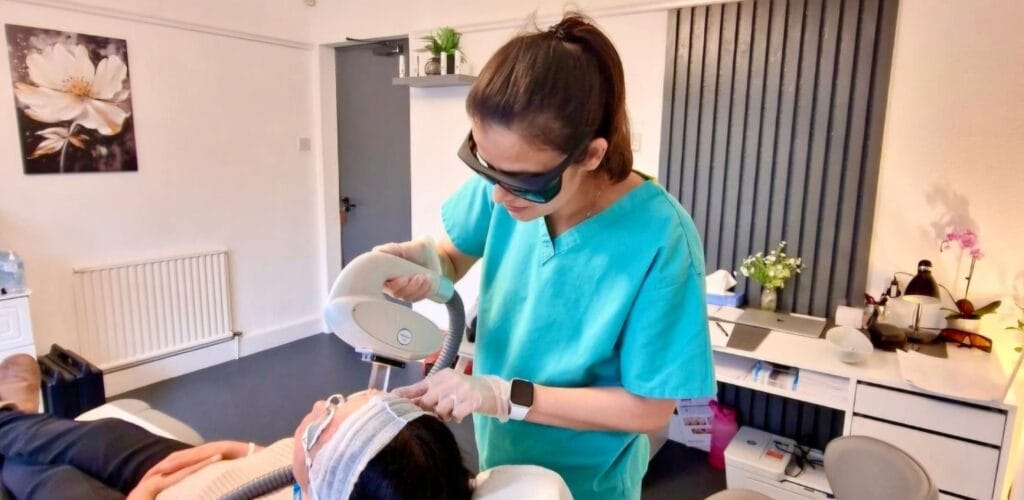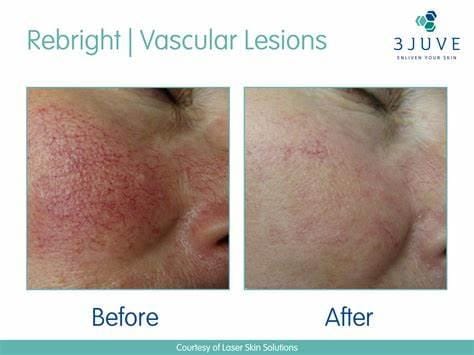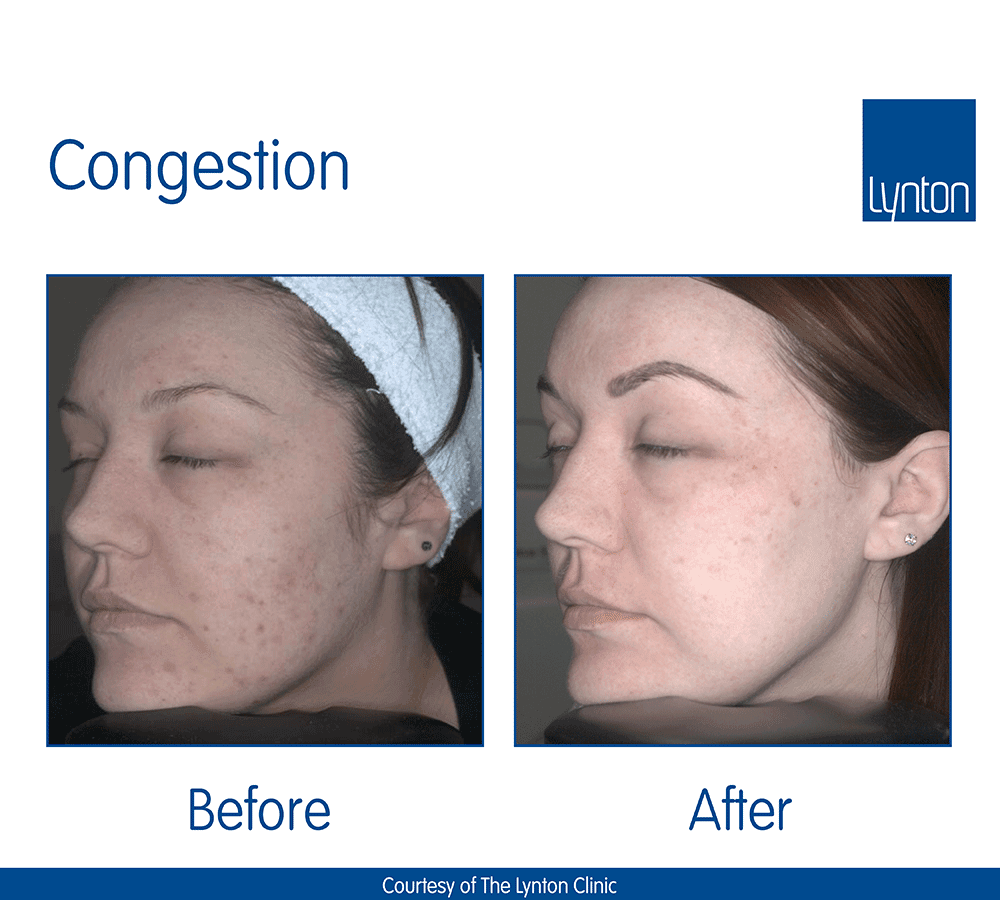Request a Free
Call Back

Treatment Type:
Non-invasive laser therapy
Purpose:
Laser skin rejuvenation is designed to improve skin texture, tone, and overall appearance by stimulating collagen production, reducing pigmentation, and minimizing fine lines, wrinkles, and acne scars.
How It Works:
The laser emits controlled light energy that penetrates the skin, targeting damaged skin cells and stimulating collagen regeneration. This process enhances skin renewal, resulting in a more youthful and radiant complexion.
Benefits:
- Reduces fine lines and wrinkles.
- Improves skin texture and tone.
- Minimizes pigmentation and sun damage.
- Boosts collagen production for firmer skin.
- Reduces acne scars, redness and enlarged pores.
Ideal For:
- Individuals with signs of aging, sun damage, or uneven skin tone.
- Those looking for non-invasive skin rejuvenation.
- Suitable for most skin types (consultation required).
Results Timeline:
- Immediate Results: Some initial redness or mild swelling may be visible right after treatment, but this generally subsides within hours to a few days.
- 1-2 Weeks: Pigmentation and skin texture improvements may begin to show as the skin heals.
- 3-6 Months: Collagen production continues, and the skin appears firmer, smoother, and more youthful over the next few months.
- Long-Term: With proper skin care, the results of laser skin rejuvenation can last for a year or more, but maintenance treatments may be needed to sustain the effects.
Treatment Summary
- Initial Treatments: 3-6 sessions, 4-6 weeks apart
- Maintenance: Every 3-6 months (depending on skin concerns)
- Procedure Time: 30-60 minutes
- Return to Work: Immediately
- Anaesthetic: None/On demand
- Full Recovery: Immediately
- Sensitivity Period: 24-48 hours
- Duration of Results: 6-12 months with proper skincare
- Risks and Complications: Temporary redness, mild sensitivity
Conclusion:
Laser skin rejuvenation is a powerful, non-invasive treatment for improving the overall quality of the skin. It can help reduce fine lines, wrinkles, and pigmentation, promote collagen production, and provide smoother skin. However, as with any cosmetic procedure, it’s essential to follow pre-treatment guidelines, choose a qualified professional, and adhere to proper aftercare to ensure optimal results and minimize risks.
Request a Free
Call Back
Frequently Asked Questions
1. Fine lines and wrinkles
2. Sun damage and age spots
3. Acne scars and other scars
4. Uneven skin tone
5. Enlarged pores
6. Redness and rosacea
Redness and Swelling: Common immediately after treatment, but typically subsides within a few hours to a few days
Dryness or Peeling: Some mild peeling and dryness may occur as the skin renews itself.
Discomfort or Sensitivity: A slight burning or tingling sensation during or after the treatment is normal.
Hyperpigmentation or Hypopigmentation: In rare cases, the skin may become darker (hyperpigmentation) or lighter (hypopigmentation) after treatment, especially in those with darker skin tones.
Scarring: Although rare, there's a risk of scarring, particularly if the skin is not cared for properly post-treatment.
Infection: Any procedure that disrupts the skin's surface carries a risk of infection, but this is minimal when proper aftercare is followed.
Skin Type: Some lasers may not be suitable for certain skin tones. Those with darker skin may need to be cautious and consult an expert, as some lasers can cause pigmentation changes in darker skin types.
Pregnancy and Breastfeeding: It is generally advised to avoid laser treatments during pregnancy or breastfeeding.
Active Skin Conditions: Avoid laser rejuvenation if you have active skin conditions like cold sores, eczema, or severe acne, as these can affect healing.
Sun Protection: Since lasers can increase sensitivity to the sun, ensure your skin is well-protected from UV rays before and after treatment.
Avoid Certain Medications: If you're on medications like blood thinners, certain herbal over-the-counter medications, retinoids, or oral or topical steroids, consult your practitioner, as they may increase the risk of side effects.
Avoid Sun Exposure: Reduce sun exposure for at least four weeks before treatment. Sunburned skin is more sensitive and may not respond well to laser therapy.
No Tanning: Avoid using tanning products or tanning beds for four weeks before treatment to prevent increased risk of pigmentation changes.
Stop Certain Skincare Products: Discontinue using exfoliants, retinoids, and strong acids (like glycolic acid or salicylic acid) 1-2 weeks before treatment, as they can increase skin sensitivity.
Hydrate: Drink plenty of water to ensure your skin is well-hydrated, which will aid in the healing process.
Medications: Inform your practitioner about any medications you're taking, especially those that affect the skin or healing process.
Moisturize: Apply a soothing, hydrating moisturizer to keep the skin from drying out and to support healing.
Sun Protection: Wear a broad-spectrum sunscreen (SPF 30 or higher) every day, even if it’s cloudy. Your skin will be more sensitive to UV rays after the treatment.
Avoid Hot Water: Avoid hot showers, saunas, or any direct heat exposure, as it can irritate the treated skin for 48 hours after the procedure.
Do Not Pick at Peeling Skin: If peeling occurs, do not pick or scratch it, as this can lead to scarring or infection.
Avoid Makeup: For the first 24 hours, avoid wearing makeup on the treated area to prevent infection and irritation.
Limit Physical Activity: Avoid strenuous exercise or activities that could cause excessive sweating for the 48 hours after treatment.
Follow-Up Treatments: Some people require multiple treatments to achieve the desired results. Your practitioner will discuss a treatment plan based on your skin type and goals.



